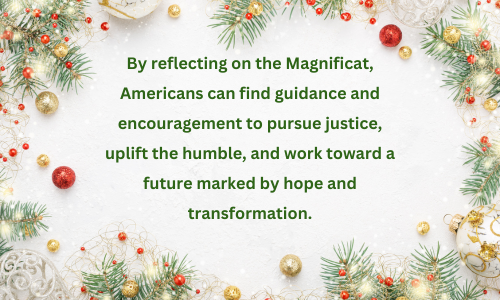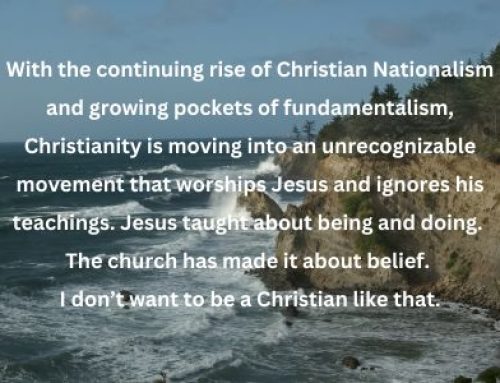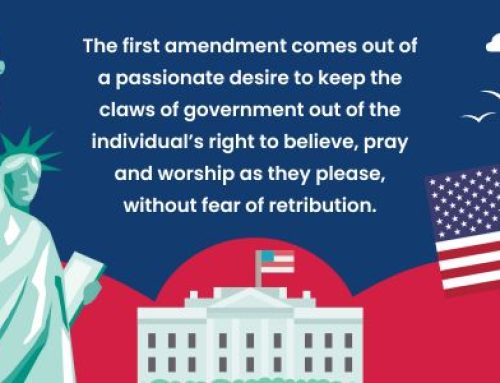 will come. It is indelibly marked on each calendar, December 25th, Christmas Day. Yes, you can ignore it, pretend it means nothing to you, and go about your day. But millions of Christians and wanna-be Christians will put up their Christmas tree and make their yearly trek to church to pay homage to an itinerant Rabbi whose teachings many of them ignore.
will come. It is indelibly marked on each calendar, December 25th, Christmas Day. Yes, you can ignore it, pretend it means nothing to you, and go about your day. But millions of Christians and wanna-be Christians will put up their Christmas tree and make their yearly trek to church to pay homage to an itinerant Rabbi whose teachings many of them ignore.Christmas 2025 and Our Reality
So, where is the hope and joy of Christmas for 2025? Do you plan to celebrate it or just kinda go through the motions and spend money that you know you shouldn’t on gifts that many don’t need or really want? The thought that it is not the gift, but the thought of the gift, that maybe is a stretch too far.
The president’s promise that he would make everything cheaper has yet to materialize, and, concerningly, prices are up 10% or more. Maybe Christmas will just have to be a simple observance with few or no gifts, with emphasis on the importance and meaning of the holiday. No gift exchange, no major meal, and not even extended family to celebrate with.
As we reflect on our current state as a country, amidst corruption of a kind we have never seen before – although Nixon kinda set the stage for Trump – how can we still find hope, and maybe a little muster of joy to make the Christmas holiday worthy of its celebration in December of 2025?
Looking Back to the Prophet Isaiah
Let’s go back and examine the prophet Isaiah to see how he handled a similar situation.
About 700 years before Christ, Isaiah lived during a time when an evil world power was beginning to spread its dark and destructive influence over the land. Assyria was conquering nation after nation, and tiny Israel and Judah didn’t seem to stand a chance.
The problem in Isaiah’s day was that as darkness swept in and the armies of Assyria came marching toward them, God’s people turned their backs on God. Isaiah promised that God would save them, but the people, and especially the king, didn’t think they needed God. Instead, they thought they could make alliances and treaties and compromises. They trusted that their good nature and “suckupness” would overwhelm their enemy and that the enemy would go soft on them.
Isaiah, as a prophet, had to tell God’s people about their ignorance and the danger they were in. He wanted the people of God to reach out and hold God’s hand and not trust in other nations or other people … but they didn’t listen. And so they were led away into exile.
Thankfully, that’s not the end of the story.
From that exile, God would bring about a new salvation, a new exodus, and a life-changing comfort through a new relationship with Him.
Isaiah’s Promise
We find this promise in Isaiah 11:1,2 and in 9:6,7:
A shoot will come up from the stump of Jesse; from his roots, a Branch will bear fruit.
The Spirit of the Lord will rest on him—the Spirit of wisdom and of understanding,
the Spirit of counsel and of might, the Spirit of the knowledge and fear of the Lord—
and he will delight in the fear of the Lord. Isaiah 11:1,2
For unto to us a child is born, to us a son is given,
and the government will be on his shoulders.
And he will be called Wonderful Counselor, Mighty God, Everlasting Father, Prince of Peace.
Of the greatness of his government and peace there will be no end.
He will reign on David’s throne and over his kingdom,
establishing and upholding it with justice and righteousness from that time on and forever.
The zeal of the Lord Almighty will accomplish this. Isaiah 9:6,7
It is important to note that the last two lines of 11:2, “fearing God” does not mean a paralyzing dread, but rather having a profound respect, reverence, and awe for God. It is about acknowledging God’s sovereignty, striving to live morally and ethically, and cultivating a relationship based on love and respect rather than terror. This understanding encourages spiritual growth and a purposeful life aligned with higher values.
God Does Not Forget
 However, Israel believes God has forgotten His promises to them, as they are under siege by pagan nations around them: “But Zion said, ‘The Lord has forsaken me, and my Lord has forgotten me.” (49:14). Listen to how God answers them in verses 15-16: “Can a woman forget her nursing child, and not have compassion on the son of her womb? Surely, they may forget, yet I will not forget you. See, I have inscribed you on the palms of My hands; your walls are continually before Me.” Did you catch that? He doesn’t just remember them. Like a teenager who writes someone’s phone number on their hand so they don’t forget it, God has permanently etched his people in His mind.
However, Israel believes God has forgotten His promises to them, as they are under siege by pagan nations around them: “But Zion said, ‘The Lord has forsaken me, and my Lord has forgotten me.” (49:14). Listen to how God answers them in verses 15-16: “Can a woman forget her nursing child, and not have compassion on the son of her womb? Surely, they may forget, yet I will not forget you. See, I have inscribed you on the palms of My hands; your walls are continually before Me.” Did you catch that? He doesn’t just remember them. Like a teenager who writes someone’s phone number on their hand so they don’t forget it, God has permanently etched his people in His mind.
But this wasn’t a message just for Jews. Go back a few verses to verse 6: “I will also give You as a light to the Gentiles, that You should be My salvation to the ends of the earth.” Gentiles? That’s non-Jews. The ends of the earth? That’s everywhere, including Keizer, Oregon. Including all my dear friends who have lost their loved ones here on earth. So, how is this Christmas season revealed? Let’s continue to look at Isaiah 49.
Isaiah promised that God would give someone who would bring forth “the Spirit of wisdom and of understanding, the Spirit of counsel and of might, the Spirit of the knowledge and fear of the Lord,” who would be not only our light but our salvation. Who is this Someone? Going back to John 5:39, Jesus said to search these Old Testament scriptures to find the answer, and that answer would be fulfilled in Him! You must cling to the promises of God, and Isaiah 49 is packed with promises that, although the memory of a loved one might fade on earth, it cannot fade with Yahweh God! In fact, verse 13 tells us to sing with joy because our God comforts His children, and He promises to be full of mercy and loving kindness to those who are afflicted with the pain and sorrow of loss: “Sing, O heavens! Be joyful, O earth! And break out in singing, O mountains! For the Lord has comforted His people, and will have mercy on His afflicted.”
That promise came to fruition in the Christmas narrative in Luke. Do not be afraid, listen up, I bring you good news of great joy which will be to all people. For there has been born this day in David’s city, the chosen one who will be the redemption of all God’s people. [Loosely translated by Curt.]
The Missing Element of Time
Like a lot of scripture, specifically those from a prophetic voice, an important element of the promise is missing. Do you know what it is? It is the element of time. WHEN IS ALL OF THIS GOING TO HAPPEN? The consolation, if there is one, is the reminder in 2 Peter 3:8, God’s time is “One day as a thousand years and a thousand years as one day.” Obviously, Isaiah never lived to see the Jews returned to their homeland. After Israel, in the Northern Kingdom, was taken over by Assyria, the Southern Kingdom of Judah was taken over by Babylon, with another massive exile of the Jewish people. It seems that much of Judaism is still waiting for that promise to materialize. Likewise, many Christians are waiting as well. It certainly raises the question, How long is a prophetic promise good for? Remembering 1 Peter’s words, seemingly forever.
Mary’s Song (The Magnificat)
Sometime later, say 700 years or so, another promise is made. This time from a young girl about to be a mother. Mary’s Song brings forth another bevy of prophetic promises.
46 And Mary said: “My soul glorifies the Lord
47 and my spirit rejoices in God my Savior,
48 for he has been mindful of the humble state of his servant.
From now on all generations will call me blessed,
49 for the Mighty One has done great things for me—holy is his name.
50 His mercy extends to those who fear him, from generation to generation.
51 He has performed mighty deeds with his arm; he has scattered those who are proud in their inmost thoughts.
52 He has brought down rulers from their thrones but has lifted up the humble.
53 He has filled the hungry with good things but has sent the rich away empty.
54 He has helped his servant Israel, remembering to be merciful
55 to Abraham and his descendants forever, just as he promised our ancestors.”
Mary’s Song, also known as the Magnificat (Luke 1:46-55), is a hymn of praise spoken by Mary, the mother of Jesus, upon learning she would bear the Messiah. The song is celebrated for its themes of humility, justice, and hope for the marginalized. We might consider how Mary’s Song might relate to what is happening in the USA today, and we can reflect on its message and how it speaks to social, political, and cultural dynamics in contemporary American society.
Themes in Mary’s Song
- Justice & Reversal of Fortunes: Mary proclaims that God “has brought rulers from their thrones but has lifted up the humble.” The song speaks to a reversal of social structures, where the lowly are elevated and the powerful are humbled.
- Care for the Poor & Marginalized: The Magnificat highlights God’s concern for the poor and hungry, saying, “He has filled the hungry with good things but has sent the rich away empty.”
- Faith & Hope: Mary expresses deep faith in God’s promises, trusting that change will come for those who are oppressed and overlooked.
Today, the United States faces significant challenges and debates around issues of inequality, justice, and the treatment of marginalized groups. The themes of Mary’s Song can be seen as both a critique and a source of hope in the American context.
- Social Justice Movements: Across the country, movements advocating for racial, economic, and gender justice echo the Magnificat’s call for lifting up the humble and challenging systems of power. Mary’s Song can inspire reflection on the need to address systemic inequalities and to listen to those whose voices have historically been marginalized.
- Economic Inequality: In a time when economic disparity is a prominent issue, Mary’s declaration about the hungry being filled and the rich sent away empty speaks to ongoing conversations about wealth, poverty, and access to resources. Her words encourage compassion and action toward a more equitable society.
- Political Polarization: The Magnificat’s emphasis on humility and reversal of fortunes challenges the prevailing attitudes of division and competition. It invites Americans to consider how humility, service, and empathy can guide public discourse and policy.
- Immigration & Refugees: As debates continue about welcoming strangers and supporting those in need, Mary’s song reminds us of God’s concern for the outsider and the downtrodden, encouraging hospitality and justice for all.
Mary’s Song remains a powerful and timely message that resonates with the challenges and hopes present in the USA today. It’s call for justice, compassion, and faith in the possibility of change offers both a critique of current injustices and inspiration for communities seeking to build a more equitable and caring society. By reflecting on the Magnificat, Americans can find guidance and encouragement to pursue justice, uplift the humble, and work toward a future marked by hope and transformation.
Has the Promise Come to Pass?
We can ask the same question that we asked of Isaiah’s prophecy: Did it ever come to pass? If so, when? I suppose it depends on who you ask. If you ask some Catholics, they would respond with certainty. Yes, of course! Why would you think otherwise? God always keeps his promises. Yet, verse 53 says that He has filled the hunger with good things; 54, and sent the rich away empty. I think we can say to date, neither of those promises has manifested. Worldwide hunger is as bad as it has ever been, and the 1% rich seem to just keep getting richer. Diversity, Equity, and Inclusion (DEI) have been pushed to the back of the bus. Seems “time” has not been on our side in this regard. Maybe it will just take another day or two?
Then again, maybe it’s really not about God doing the work of fulfilling his promises. Perhaps God is suggesting a way forward, leaving the work of promises to us. God provides the words of hope and possibility. We, his people, provide the work and sweat equity forward.
I believe that Mary’s Song is more than just hyperbole; I believe the walls of Jericho are starting to come down. The House and the Senate voted unanimously (except one no vote in the House) to release the Epstein files. The “libelization” bell of the Trump Administration now has a crack in it. I would not be surprised to see it come completely unhinged from the King’s tower. Lady Justice has just opened her eyes in full view of what’s to come.
Closing Reflection
I would ask you to read and reread Mary’s Song. It might well be the Christmas message that we need to put our hope in for Christmas 2025. I think I can run with that. How about you?
MARY CHRISTMAS!




